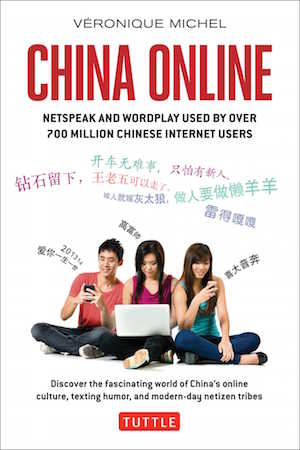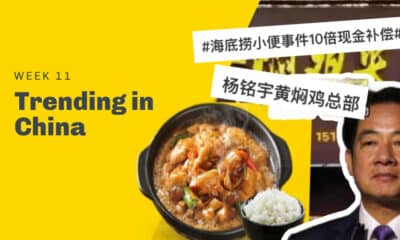China Books & Literature
Review: China Online – Netspeak & Wordplay by Chinese Internet Users
China’s Internet is a hot topic nowadays. With more and more books published on the topic, What’s on Weibo picked a recent one to review. This edition: China Online – Netspeak & Wordplay Used By Over 700 Million Chinese Internet Users by Véronique Michel, Tuttle Publishing, 2015, 159 pages
Published
10 years agoon
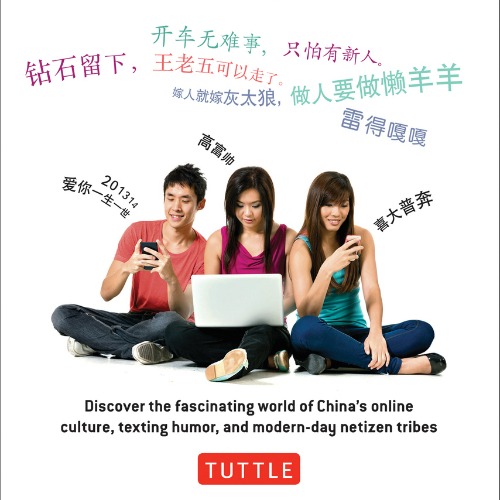
China’s Internet is a hot topic nowdays. With more and more books published on the topic, What’s on Weibo picked a recent one to review. This edition: China Online – Netspeak & Wordplay Used By Over 700 Million Chinese Internet Users by Véronique Michel, Tuttle Publishing, 2015, 159 pages.
With the largest Internet population in the world, China has a unique online culture. China Online, a new book by translator and multilingual netizen Véronique Michel, offers an exploration into China’s rapidly changing society and its flourishing Internet environment, where new expressions emerge every day. Michels has created an accessible and entertaining introduction to China’s modern-day language and culture.
Michels has divided her book in two parts. The first part, ‘Portraits’, uncovers how neologisms like “Mortgage Slaves” (房奴 fang nu) or “Café Latte Tribe” (拿铁族 natie zu) identify different groups in China’s contemporary society. The drastic political and economic changes after the 1980s have led to a society where studying hard, finding a good job and spending money have become the essential strategies to survive. The “Ants Tribe” (蚁族 yizu), for example, refers to those who want to make their “wages fly” (让工资飞 rang gongzi fei) in order to set up their homes and start a family in suburban China. In the second part, ‘Word Play’, Michels gives a myriad of examples on China’s creative expressions, and what they reveal about society today.
As China’s online environment moves with incredible speed, any book on it will inescapably be outdated from the moment it is published. Popular expressions die out as quickly as they came up. But because Michels offers the cultural backgrounds to a range of expressions and catch phrases, it remains a relevant, no-nonsense and entertaining resource for anyone, amateur or expert, who wants to develop a deeper understanding of China and Chinese language today.
What’s on Weibo’s verdict: 7.5/10
Plus points: easy to read, accessible, clear overview of new & classic online expressions, explanation of origins.
Downsides: outdated soon, somewhat superficial. How could Michels fail to write more about online censorship, and how it is evaded through wordplay and puns?
By Manya Koetse
Follow @WhatsOnWeibo
This review was originally written for Bable, The Language Magazine.
Manya is the founder and editor-in-chief of What's on Weibo, offering independent analysis of social trends, online media, and digital culture in China for over a decade. Subscribe to gain access to content, including the Weibo Watch newsletter, which provides deeper insights into the China trends that matter. More about Manya at manyakoetse.com or follow on X.

You may like
China Arts & Entertainment
Chiung Yao’s Suicide Farewell Letter: An English Translation
Published
4 months agoon
December 7, 2024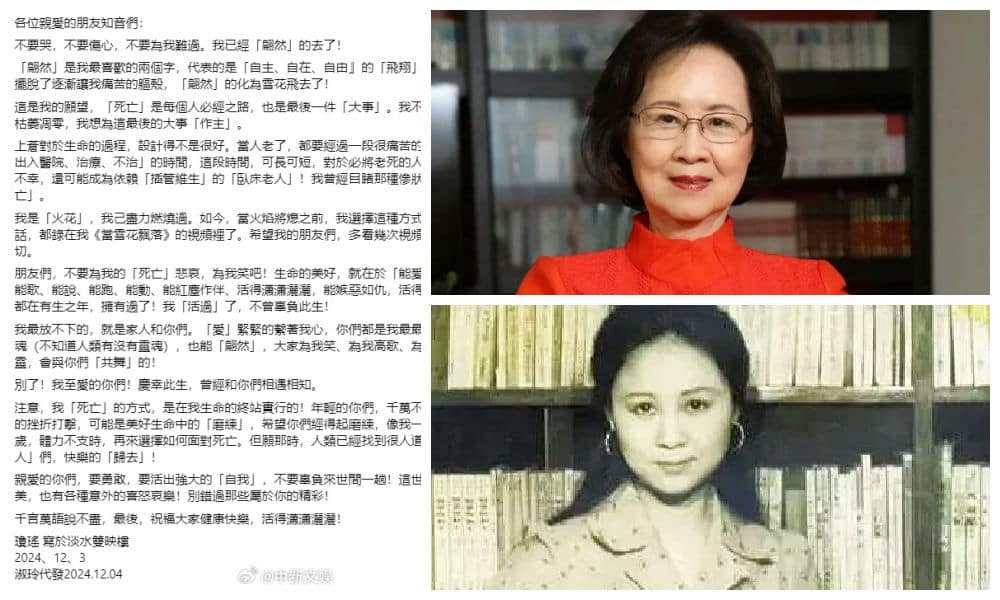
Chinese netizens mourned the passing of Taiwanese writer Chiung Yao (琼瑶) this week. Chiung Yao, one of China’s most beloved romance novelists, passed away at the age of 86.
Among her many works, Chiung Yao is cherished by many netizens in mainland China as part of their collective memories from the 1980s and 1990s. Some of the most iconic Chinese dramas, such as My Fair Princess (also: Return of the Pearl Princess, 還珠格格), were written by Chiung Yao.
On December 4, she was found on her sofa at home, leaving behind a suicide note. The cause of death was determined to be asphyxiation due to carbon monoxide poisoning.
In her farewell letter to loved ones and fans, she wrote the following:
“To all my dear friends:
Do not cry, do not grieve, and do not feel sad for me. I have already fluttered away [翩然 piānrán] effortlessly.
I love the word “翩然” [piānrán]. It represents flying in the air independently, easily, and freely. Elegantly and gracefully, I have shed the body that gradually caused me pain and have ‘fluttered away,’ transforming into snowflakes flying into the sky.
This was my wish. “Death” is a journey everyone must take—it is the final significant event in life. I did not want to leave it to fate, nor did I want to wither away slowly. I wanted to have the final say in this final event.
God has not designed the process of life particularly well. When a person grows old, they have to go through a very painful period of ‘becoming weak, degeneration, illness, hospitalization, treatment, and fatal illness.’ This period, may it be long or short, is a tremendous torment for those who are destined to grow old and die! Worst of all, some may become bedridden, dependent on tubes for survival. I have witnessed such tragedies, and I do not want that kind of “death.”
I am a “spark,” and I have already burned as brightly as I could. Now, before the flame finally dims, I have chosen this way to make a light departure. I have recorded everything I wish to say in my video “When Snowflakes Fall Down” (当雪花飘落). I hope my friends can watch it a few times to grasp everything I wanted to express.
Friends, do not mourn my death but smile for me! The beauty of life lies in the ability to love, hate, laugh, cry, sing, speak, run, move, be together until death parts us, live freely, despise evil with a passion, and live life boldly. I have experienced all these things in my lifetime! I truly ‘lived’ and did not waste this life.
What I find hardest to let go of are my family and all of you. “Love” is what is tightly bound to my heart, and I am reluctant to part with you. To allow my soul (if humans even have souls) to also ‘flutter away,’ please laugh for me, sing loudly for me, and dance in the breeze for me! My spirit in the heavens will dance together with you!
Farewell, my dearest ones! I am grateful for this life, where I had the chance to meet and know you all.
Take note of the way I died: I was at the final station of my life! For those of you who are still young, never give up on life lightly. Momentary setbacks or blows may be the “training” for a beautiful life. I hope you will be able to endure those, as I did, and live to 86, 87.. years old. When your physical strength fades, then decide how to face death. By then, perhaps they will have found more humane ways to help the elderly “leave joyfully.”
Dear friends, be brave, be the greatest version of yourself. Do not waste your journey through this world! Though this world is not perfect, it is filled with unexpected joys, sorrows, and laughter. Don’t miss out on all the wonders out there for you.
There are a thousand more things to say, but in the end, I wish everyone health, happiness, and a life of freedom and joy.”
This translation was previsously published on my X channel here.
By Manya Koetse
(follow on X, LinkedIn, or Instagram)
Spotted a mistake or want to add something? Please let us know in comments below or email us. First-time commenters, please be patient – we will have to manually approve your comment before it appears.
©2024 Whatsonweibo. All rights reserved. Do not reproduce our content without permission – you can contact us at info@whatsonweibo.com.
China Books & Literature
The Price of Writing Smut: Inside China’s Crackdown on Erotic Fiction
The crackdown on Haitang Literature City has led to greater awareness of it, with Chinese netizens now paying closer attention to the repression of erotic content and the struggles faced by its authors.
Published
5 months agoon
November 3, 2024By
Ruixin Zhang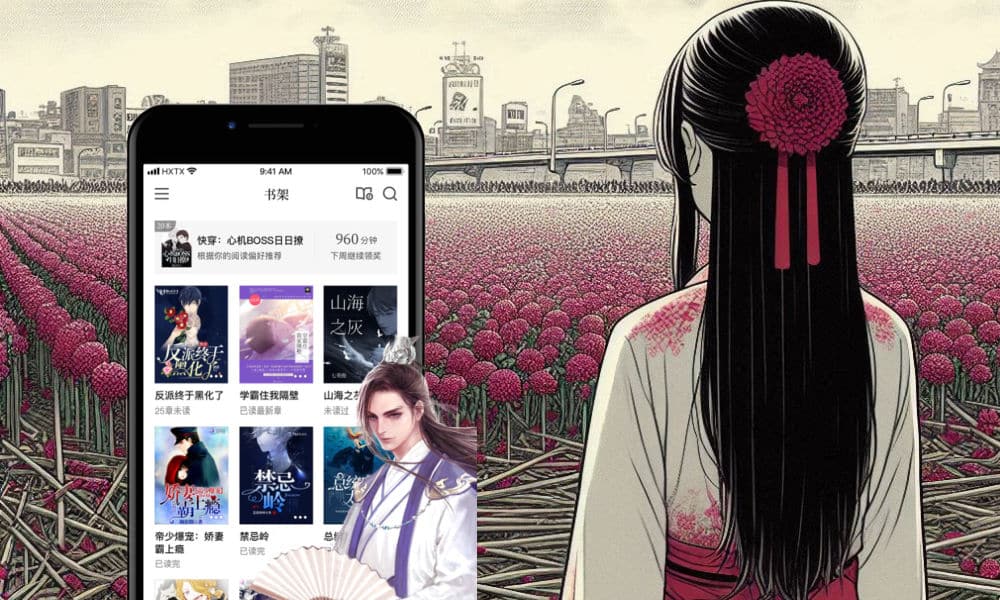
A recent crackdown on Chinese authors writing erotic webnovels has sparked increased online conversations about the Haitang Literature ‘Flower Market’ subculture, the challenges faced by prominent online smut writers, and the evolving regulations surrounding digital erotica in China. But how serious is the “crime” of writing explicit fiction China today?
You might have heard of haitang (海棠), the Chinese crabapple flower, but chances are you haven’t come across Haitang Literature City (海棠文学城)—and you’re not alone. Most people in China haven’t heard of it either. Haitang Literature City is a Taiwan-based, Chinese-language website dedicated primarily to female-oriented smut fiction, with numerous contributors from mainland China.
‘Smut fiction’ is a genre focused on explicit, sexual content and themes. Stories in this genre often emphasize the physical relationships between characters, with detailed erotic scenes. On Haitang Literature City, the most popular category is BL (Boys’ Love), which centers on romantic and erotic relationships between male characters and is written mainly for a female audience (read more here). The site also features a variety of heterosexual and lesbian stories, ranging from straightforwardly explicit to more unusual narratives. One consistent aspect across the site: most of the authors are women, writing primarily for a female readership.
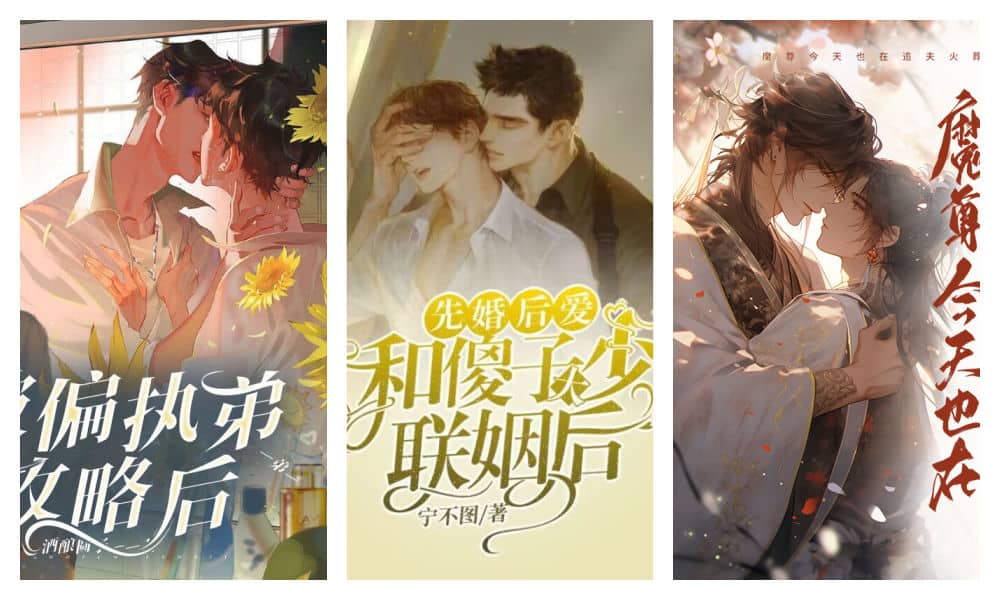
Example covers of online erotica
Haitang Literature City, known as the ‘Flower Market’ (花市) by its users, has stayed relatively underground within certain reading circles. Recently, however, a help post on Weibo has brought this hidden flower market into the spotlight, sparking considerable buzz online.
The post came from a user named “Rain Painted on a Sunny Day” (@晴天画的雨), the younger sister of the Haitang author known as “Yunjian” (云间, “Between the Clouds”). On October 16, she revealed that Yunjian had been detained since June 20 and is only allowed visits from her lawyer. The arrest notice she shared cites the charge: “suspected of producing and disseminating pornographic materials for profit” (“传播淫秽物品牟利罪”).
Yunjian, a prominent author on Haitang, has been writing for over a decade, producing tens of millions of words. Her detention not only forces her to forfeit all the royalties earned over the past ten years—now labeled “illicit earnings”—but also means she faces time in prison. While “Rain Painted on a Sunny Day” acknowledged her sister’s “offense” in the post, she explained that the resulting heavy fines have left their family deeply in debt, struggling to make ends meet. After the post went up, many of Yunjian’s readers expressed heartbreak over her situation and began donating to help.
Meanwhile, Haitang Literature City, once part of an underground culture, has been brought into the spotlight. “What is Haitang Literature City? Why are the authors on this site charged with the crime of producing and distributing obscene materials? Can someone explain? It feels like a completely different world—I truly have no idea about any of this,” one Weibo user wrote. Ironically, the crackdown on the site has led to greater awareness of it, with Chinese netizens now paying closer attention to the long-standing repression of erotic content authors and the ongoing struggles they face.
MONTHS OF CRACKDOWN
“They’re back to where they started, with nothing to their name”
The crackdown on authors of explicit content from Haitang Literature City began earlier in 2024. Blogger @LXC (@洛曐曟LXC), who has been documenting these events, described how police in Anhui Province launched a cross-provincial operation in June. On June 20, they arrested Haitang distributors along with several of its most successful authors. The Haitang site quickly shut down the next day, citing maintenance. The platform remained offline for several days.
During this shutdown, many authors aware of the arrests requested that their published work be hidden. As a result, Haitang locked down all site content, allowing authors to unblock their works only upon request.
Most of the first batch of arrested authors were released around June 20, with some warning others against writing on Haitang due to the high risks involved. However, this information circulated only within a small group, so few were aware of it. Authors who had earned larger sums from their writing were unable to arrange their release and remained in custody.
How did Haitang respond? Despite being aware of the arrests, the site apparently chose not to inform other authors of the risks, possibly prioritizing profits and readership. Blogger @LXC expressed her frustration with Haitang for misleading authors who were completely unaware of the situation, as well as others who had heard unverified rumors, into unlocking their columns for subscriptions. Seeing this, several smaller authors followed suit and unlocked their works as well.
From late July to early August, another group of authors was summoned by the police. Nearly all of this second batch of arrested authors were among those who had reapplied to unblock their columns after the site had reopened. LXC suggested that the site’s mismanagement and silence about the initial arrests were responsible for these authors getting into trouble.
Yunjian remains one of the authors detained since the initial crackdown in June and has yet to be released. Alongside her, many lesser-known authors are also struggling, with many relying on their writing on Haitang to make ends meet. Among them are stay-at-home moms, low-income students, and young women from rural areas who cannot find work. After all this upheaval, their situations have only worsened, and they are likely in even more dire straits than the more well-known authors.
“To me, it’s straightforward,” @LXC wrote: “These women earned money and, as a result, improved their previously poor lives. Now that money is being taken away from them, they’re back to where they started, with nothing to their name.”
A DECADE-LONG SURVIVAL GAME
“Censorship has reached absurd levels”
This isn’t the first time Chinese online smut writers have been targeted under the country’s strict censorship laws governing pornographic content. Since China launched its “Clean Internet Campaign” in 2014, many smut writers and online fiction platforms have faced consequences. In June 2015, author Ding Yi (丁一) received a suspended three-and-a-half-year sentence for her “explicit” novels on the platform Jinjiang Literature City (晋江文学城). Another writer, Mo Xiang Tong Xiu (墨香铜臭), known for her novel The Untamed and its TV adaptation, was sentenced to three years on “illegal publishing” charges. Although her case didn’t specifically involve “producing and disseminating pornographic materials for profit,” her arrest was still part of the broader anti-pornography campaign due to the erotic themes in her work.
Another well-known BL writer, Tian Yi (天一), faced an even harsher punishment. In 2018, she was sentenced to ten and a half years in prison for her novel Absolute Domination, which included erotic depictions of gay relationships and had earned her around 150,000 yuan ($21,000) from print sales. A young woman who assisted with typesetting was also implicated—she received a four-year sentence and a 10,000-yuan ($1,400) fine for her 3,100-yuan ($430) part-time payment.
While authors have faced relentless crackdowns, websites themselves have also struggled to survive. Jinjiang Literature City (晋江文学城)—a major online fiction platform known for hosting works with mature content—has been shut down and pressured into strict content checks, with some smaller sites shut down entirely. After multiple shutdowns and rounds of scrutiny, Jinjiang became almost hyper-vigilant, enforcing its self-censorship to an extreme. Now, any sensitive terms are automatically replaced with “口口,” as the site pushes to remove anything that might be seen as explicit by the authorities.
Many netizens have pointed out that the “content review guidelines” (link) of the Jinjiang platform are ironically hilarious: “Any depiction below the neck involving intimacy, body parts, sexual acts, sexual thoughts or fantasies, sexual organs, or excessive violence is considered explicit and thus prohibited,” it states. “Even if it’s less direct and more subtle, if the scenes are too lengthy or portray the entire process, they are also counted as explicit content.” Netizens joke that as long as the reviewers think you’re being suggestive, it’s a off limits—censorship has reached absurd levels.
However, readers’ demand for pornographic works hasn’t diminished at all in this decade-long, intense survival game. A quick search for names like “Tian Yi,” “Yunjian,” or “Mr. Shenhai” on Weibo still reveals hundreds, if not thousands, of people actively seeking and sharing resources for their novels.
THE PRICE OF EROTIC CONTENT IN CHINA
“There are people who commit crimes that truly harm others who don’t face such severe sentences”
How serious is the “crime” of writing online smut in China? While Yunjian has yet to be tried or sentenced, online discussions suggest she may face severe punishment. Her royalties over the past decade exceed 250,000 yuan ($35,000), potentially classifying her case as a particularly serious offense under Chinese law for “producing and disseminating pornographic materials for profit,” due to its perceived negative impact on youth and potential to corrupt social morals. This could result in fines of one to five times her earnings and likely a prison sentence of over ten years.
Recent cases indicate similar outcomes: on October 17, a Weibo account called @HuaiBeiLiXinWrongfulCase (@淮北李鑫冤案) posted a plea, revealing that author Li Xin (李鑫), who co-wrote the historical fantasy Six Dynasties with Luo Sen (罗森), was detained on the same charge after earning 300,000 yuan ($42,118) in royalties, which led to a ten-year prison sentence. As a similarly prominent author, Yunjian may face even harsher penalties and potentially an even longer prison term.
🌟 Attention!
For 11 years, What’s on Weibo has remained a 100% independent blog, fueled by our passion to write about China’s digital culture and online trends. Over a year ago, we introduced a soft paywall to ensure the sustainability of this platform. We’re grateful to all readers who’ve subscribed since 2022. Your support has been invaluable. But we need more subscribers to continue our work. If you appreciate our content and want to support independent coverage on digital China, please become a subscriber today. Your support keeps What’s on Weibo going strong!
Can writing smut really lead to such severe sentences? Some netizens have questioned this, speculating that the heavy penalties might actually be due to alleged money laundering or tax evasion. However, these theories were quickly dismissed: the royalties earned by Haitang authors come from legitimate payments made by actual readers, making money laundering unlikely. As for tax evasion, Haitang is a Taiwanese website and isn’t required to pay taxes to the mainland government. Even if mainland authors were guilty of tax evasion, they would likely just be required to pay back taxes rather than face prison time. Relying on these conspiracy theories to justify harsh penalties seems like a way to avoid addressing deeper issues within the current legal system.
Punishment can be actually be heavy based on various other factors. Some netizens have pointed out that the law states that making a profit of 250,000 yuan ($35,000) or achieving over 250,000 clicks is considered an particularly serious offense, potentially leading to a prison sentence of over ten years. But for online writers, especially prominent authors, reaching 250,000 clicks is relatively easy, which put them significantly at risk for for receiving heavy sentencing.
Moreover, the criteria for determining what actually constitutes ‘pornographic materials’ are quite vague. The family of the detained author Li Xin pointed out on Weibo that Article 367 of the Criminal Law specifies that literary and artistic works with artistic value, even if they contain erotic elements, should not be classified as pornographic. While Li Xin’s novels do feature erotic content, they also include a historical, cultural, military, economic, and social insights, leading to a variety of discussions among online readers.
“If this were truly an obscene novel overall, where would such rich discussions have come from?” The family wondered: “While the book does contain some unapologetic depictions of [sexual] relations, they serve only as parts of the story’s progression and character development. Could this limited content really lead to the moral corruption of ordinary people?”
The biggest controversy here centers on the stark contrast between the punishment for writing smut and for committing far more severe crimes. “Ten years is way too long; there are people who commit crimes that truly harm others who don’t face such severe sentences,” one netizen lamented on Weibo in response to Li Xin’s case.
This frustration resonates widely online. According to Chinese law, sentences for rape usually range from 3 to 10 years, with only exceptionally severe cases—such as those involving minors or resulting in serious injury or death—receiving more than ten years.
Angry netizens complain that recent court decisions on heinous crimes like sexual assault, voyeurism, and domestic violence often result in lighter sentences than what Yunjian is facing. Author @LuoSaiEr (@罗塞迩) highlighted a recent case of a man who recorded 75,000 videos for profit over five years and received only a one-year prison sentence. The stark contrast between the punishment for a smut writer and for actual sexual offenders, regardless of the legal complexities, is hard for the public to accept.
In China’s legal circles, there’s a growing belief that the laws around “producing and disseminating pornographic materials for profit” are seriously outdated, with penalties that often don’t align with the actual harm caused to society. Ever since the Tianyi case, legal experts have pointed out that the sentences don’t reflect the realities of today’s world.
Yet for ordinary people who now struggle to find erotic content, discussing legal reform feels almost pointless. With pop-up ads and QR codes linking to porn sites, hidden cameras in hotel rooms, and private videos being sold in group chats, it’s frustrating to see the law come down so hard on smut writers—who have no real victims—while many actual sex offenders walk free. As one netizen put it, this situation “shames the judiciary and makes it look disgraceful.”
Four months later, Yunjian remains in detention. With the support of donations from concerned netizens, her family has overcome their worst financial struggles and no longer accepts contributions. But for them—and for every writer and reader affected by this case—the fight for justice and their right to create still feels like a long, uncertain road ahead.
Update December 2024 (taken from our Newsletter):
We wanted to provide some updates about the erotic content writers we discussed previously, as their final sentencing results were announced recently. One of the authors convicted is Yunjian (云间), one of the more prominent writers of these sexually explicit web novels. As reported by Lianhe Zaobao, she was sentenced to 4 years and 6 months in prison for profiting from illegal activities. Some authors who were unable to gather funds to return illicit gains faced even longer sentences.
On Weibo, some people are outraged over the severity of the punishment, especially since Yunjian reportedly earned no more than 2 million RMB ($275,000) over several years of publishing. However, there are also some who defend the state’s crackdown on online “obscenities,” arguing that distributing such explicit content is a serious crime.
One commenter on Weibo wrote: “I don’t want to describe works filled with hope as ‘obscene materials’ (淫秽物品). I don’t want to define the hard-earned income from creative efforts as ‘illegal earnings’ (赃款). I don’t want to reduce the warm and joyful exchanges between readers and authors to the act of ‘distributing obscene materials’ (传播淫秽物品). This is the most degrading and evil form of humiliation.”
By Ruixin Zhang
Independently covering digital China for over a decade. Like what we do? Support us and get the story behind the hashtag by subscribing:
edited for clarity by Manya Koetse
Spotted a mistake or want to add something? Please let us know in comments below or email us. First-time commenters, please be patient – we will have to manually approve your comment before it appears.
©2024 Whatsonweibo. All rights reserved. Do not reproduce our content without permission – you can contact us at info@whatsonweibo.com.
Subscribe

Strange Encounter During IShowSpeed’s Chengdu Livestream

IShowSpeed in China: Streaming China’s Stories Well

How K-pop Fans and the 13-Year-Old Daughter of Baidu VP Sparked a Debate on Online Privacy

Squat or Sit? China’s Great Toilet Debate and the Problem of Footprints on the Seat

Weibo Watch: The Great Squat vs Sitting Toilet Debate in China🧻

Our Picks: Top 10 Chinese Buzzwords and Phrases of 2024 Explained

“Dear Li Hua”: The TikTok/Xiaohongshu Honeymoon Explained

Beyond the Box Office: What’s Behind Ne Zha 2’s Success?

Weibo Watch: Christmas in China Is Everywhere and Nowhere

Weibo Watch: A New Chapter

15 Years of Weibo: The Evolution of China’s Social Media Giant

Tuning Into the Year of the Snake

The ‘China-chic Girl’ Image and the Realities of China’s Competitive Food Delivery Market

TikTok Refugees, Xiaohongshu, and the Letters from Li Hua

“Black Myth: Wukong”: From Gaming Screens to the CMG Spring Festival Gala?
Get in touch
Would you like to become a contributor, or do you have any tips or suggestions? Get in touch here!
Popular Reads
-

 China Insight11 months ago
China Insight11 months agoThe Tragic Story of “Fat Cat”: How a Chinese Gamer’s Suicide Went Viral
-

 China Digital10 months ago
China Digital10 months agoChina’s 2024 Gaokao Triggers Online Discussions on AI
-

 China Arts & Entertainment11 months ago
China Arts & Entertainment11 months agoSinging Competition or Patriotic Fight? Hunan TV’s ‘Singer 2024’ Stirs Nationalistic Sentiments
-

 China Arts & Entertainment12 months ago
China Arts & Entertainment12 months ago“Old Bull Eating Young Grass”: 86-Year-Old Chinese Painter Fan Zeng Marries 36-Year-Old Xu Meng

